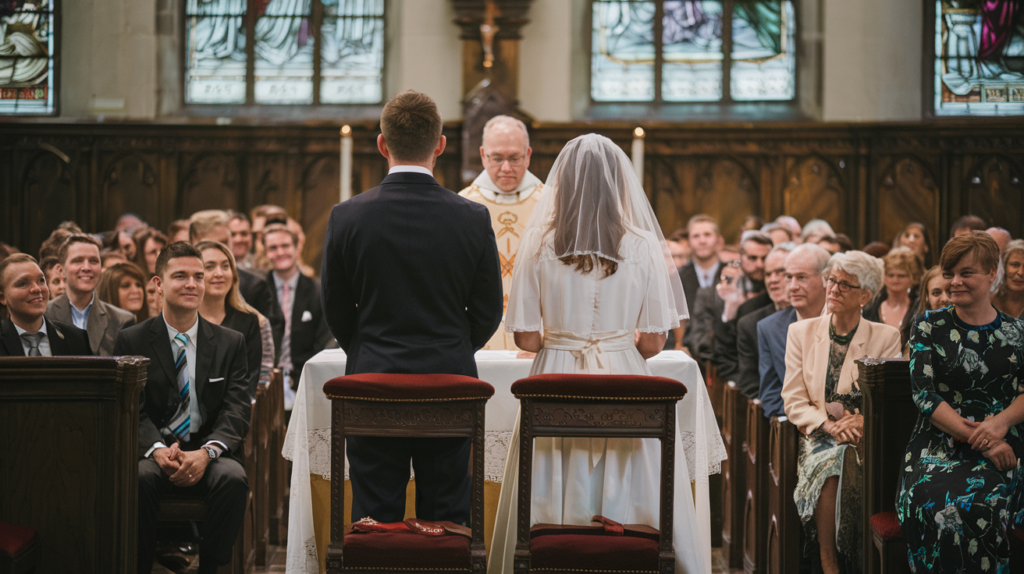
Key points
Here are 3 key points about the history of “speak now or forever hold your peace” phrase:
- The origin is not definitively known, but some think it dates back to the Middle Ages in England when marriage vows were made publicly.
- It was a way for anyone to voice an objection if they knew of a legal reason the couple should not wed.
- It evolved into a more general opportunity to speak up about the marriage before the ceremony was completed.
Contents
The saying Speak now or forever hold your peace has an interesting history. It is commonly used nowadays during weddings when the priestess asks if anyone has an objection to the marriage. But where did this phrase come from and how did it become so popular in weddings?
Historical Origins and Cultural Significance
The Book of Common Prayer from the Church of England gives the origins of “Speak now or forever hold your peace”. This book from 1549 had a line that asked those at a wedding ceremony if they knew of any reason why the couple could not marry. The basic idea was to give those had a problem with the marriage a last chance to say so before it got sealed.
This custom was adopted by the law regulating marriage in English-speaking countries. This saying transferred to the world of culture, and it furthered the idea of raising objections at the right time or not at all.
Usage in Legal and Ceremonial Contexts
The phrase is still used in marriage laws all across the world today. In America, the laws of several states require officiants to ask for any objections at the wedding ceremony. It means they have to talk up at that time if anyone has a problem with that.
Lately, it has become a standard part of the Western wedding tradition besides the legal use. The old saying from long ago now signifies a couple who commit to each other devoid of reservation. At any point in the ceremony, a couple might hear these words being spoken. This point usually is the finality of their union.
Linguistic Roots and Evolution
Speak now or forever hold you peace is an expression which is rooted in English common law. In the past, the priest would ask if anyone has any objections with regard to the marriage. This way issues were spoke about before the marriage ceremony was finished. Over time, this phrase stayed despite the change of the Marriage Act of 1836 in England and Wales,. These days, the phrase is more used for a light-hearted part of the contemporary wedding trend.
Etymology and linguistic development
In Ancient England weddings had to take place under certain canon law rules of the church. The priest asked everyone present at the ceremony if they knew any reasons why the couple can’t get wed. Asking this question allows people to speak about issues that may impede the marriage because of impediments like pre-contracts or family ties. Saying the phrase was a guest’s cue to raise worries or stay silent after if they want to.
Semantic shifts over time
Throughout the years, as marriage laws and practices changed, the meaning of the phrase also changed meanings. Although it was designed to serve a legal purpose, it is used mainly for symbolism and ceremony. Compared to the past, marriages of today, there are no requisites of public scrutiny.
Frequently Asked Questions (FAQ)
Where did the tradition of the father walking the bride down the aisle come from?
The tradition of the bride’s father walking her down the aisle and ‘giving her away’ dates back to arranged marriages, when women were essentially property being handed from one man to another. Over time it evolved into a symbol of the father giving his blessing.
What is the purpose of saying wedding vows?
Wedding vows signify the commitment and promises the couple are making to each other in their marriage. The words said out loud reinforce the seriousness and importance of the lifelong union they are entering into.
Why do wedding ceremonies traditionally end with a kiss?
The kiss represents the seal of the marital covenant. It marks the first act of marriage between the new husband and wife and signals the finalization of their union before witnesses.

I am a free-spirited author with the focus of relationships, travel, mental health, and womanhood. I am still new to the writer scene but am excited for the journey that awaits.